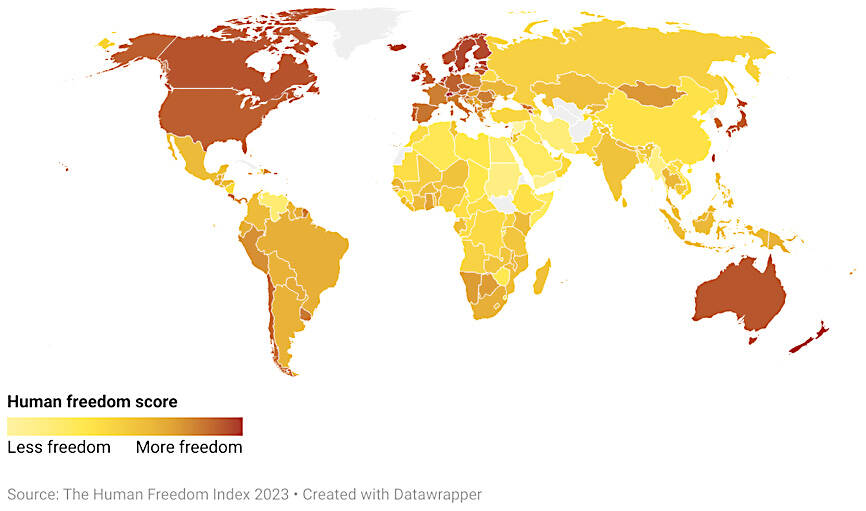Taiwan ranked 12th among 165 jurisdictions around the world and first in Asia in this year’s Human Freedom Index with a score of 8.56, retaining its position from the previous year.
The index, compiled by the Washington-based Cato Institute and the Vancouver-based Frasier Institute, ranked 165 jurisdictions for “personal,” “economic” and “human” freedom in 2021, the most recent year for which sufficient data were available, the report said.
Taiwan scored 7.97 for economic freedom, or ranking 11th in the world — up from 24th in 2020 — and 8.98 for personal freedom, 12th and unchanged from 2020.

Photo: Screen grab from the Cato Institute’s Web site
The report defines freedom as the absence of coercive constraints.
The criteria for economic freedom include size of government, legal system and property rights, sound money — focused mainly on inflation — freedom to trade internationally and regulation.
Personal freedom criteria cover the rule of law, security and safety, movement, religion, expression and information, relationships, and association, assembly and civil society.
Human freedom “deteriorated severely in the wake of the coronavirus [COVID-19] pandemic,” the report said, pointing to “significant declines in the rule of law, freedom of movement, expression, association and assembly, and freedom to trade.”
Taiwan’s scores also declined after consistent rises from 8.31 (28th) in the first year of the index in 2000 to peaks of 8.81 in 2016, when it was 17th in the world, and 2019 (14th).
In 2020 and 2021, Taiwan’s score fell to 8.56, with its economic freedom score dipping below 8 for the first time since the middle of the 2010s and personal freedom dropping below 9 for the first time since the early 2000s.
However, only two main factors showed substantial declines in those two years in the index — freedom of movement, likely due to travel restrictions related to the pandemic, and media and expression as defined by Varieties of Democracy, a Swedish research institute.
In other categories, the scores for Taiwan were largely unchanged.
Switzerland was No. 1 for the fourth year in a row, followed by New Zealand, Denmark, Ireland, Estonia and Sweden (tied for fifth), Iceland, Luxembourg, Finland and Norway.
Japan was the second-highest in Asia at 16th, followed by South Korea (28th), Armenia (33rd) and Singapore (44th).
China was 149th and the lowest-ranked jurisdiction was Syria.

INVESTIGATION: The case is the latest instance of a DPP figure being implicated in an espionage network accused of allegedly leaking information to Chinese intelligence Democratic Progressive Party (DPP) member Ho Jen-chieh (何仁傑) was detained and held incommunicado yesterday on suspicion of spying for China during his tenure as assistant to then-minister of foreign affairs Joseph Wu (吳釗燮). The Taipei District Prosecutors’ Office said Ho was implicated during its investigation into alleged spying activities by former Presidential Office consultant Wu Shang-yu (吳尚雨). Prosecutors said there is reason to believe Ho breached the National Security Act (國家安全法) by leaking classified Ministry of Foreign Affairs information to Chinese intelligence. Following interrogation, prosecutors petitioned the Taipei District Court to detain Ho, citing concerns over potential collusion or tampering of evidence. The

NEGOTIATIONS: Taiwan has good relations with Washington and the outlook for the negotiations looks promising, Minister of Economic Affairs J.W. Kuo said Taiwan’s GDP growth this year is expected to decrease by 0.43 to 1.61 percentage points due to the effects of US tariffs, National Development Council (NDC) Minister Paul Liu (劉鏡清) said at a meeting of the legislature’s Economics Committee in Taipei yesterday, citing a preliminary estimate by a private research institution. Taiwan’s economy would be significantly affected by the 32 percent “reciprocal” tariffs slapped by the US, which took effect yesterday, Liu said, adding that GDP growth could fall below 3 percent and potentially even dip below 2 percent to 1.53 percent this year. The council has commissioned another institution

NEGOTIATIONS: The US response to the countermeasures and plans Taiwan presented has been positive, including boosting procurement and investment, the president said Taiwan is included in the first group for trade negotiations with the US, President William Lai (賴清德) said yesterday, as he seeks to shield Taiwanese exporters from a 32 percent tariff. In Washington, US Trade Representative Jamieson Greer said in an interview on Fox News on Thursday that he would speak to his Taiwanese and Israeli counterparts yesterday about tariffs after holding a long discussion with the Vietnamese earlier. US President Donald Trump on Wednesday postponed punishing levies on multiple trade partners, including Taiwan, for three months after trillions of US dollars were wiped off global markets. He has maintained a 10 percent

TRADE: The premier pledged safeguards on ‘Made in Taiwan’ labeling, anti-dumping measures and stricter export controls to strengthen its position in trade talks Products labeled “made in Taiwan” must be genuinely made in Taiwan, Premier Cho Jung-tai (卓榮泰) said yesterday, vowing to enforce strict safeguards against “origin laundering” and initiate anti-dumping investigations to prevent China dumping its products in Taiwan. Cho made the remarks in a discussion session with representatives from industries in Kaohsiung. In response to the US government’s recent announcement of “reciprocal” tariffs on its trading partners, President William Lai (賴清德) and Cho last week began a series of consultations with industry leaders nationwide to gather feedback and address concerns. Taiwanese and US officials held a videoconference on Friday evening to discuss the